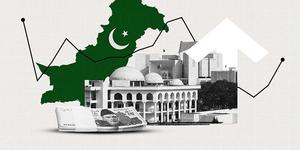Asia Pacific
Explore Gallup's research.

Globally, views of how women are treated are more positive today than they have been at most points in the past decade. Views have improved among women and men, but gaps remain.

Across 25 countries hit hardest by the financial crash in 2008, trust in banks finally recovered to precrisis levels in 2025.

As Thailand's general election looms, nearly half of Thais say the economy is the most important problem facing the country.

Worldwide, economic issues dominate people's views of their country's most important problem.

Explore the connection between global peace, wellbeing and health in this report based on 145,000+ interviews across 144 countries and areas.

Gallup data from Pakistan show cautious improvements in people's perceptions of the economy, leadership, corruption and wellbeing.

On average, Russian and Ukrainian leadership receive similar approval ratings from their regional neighbors, but there are underlying divisions.

New data from South Korea show rising confidence in institutions after a period of instability, alongside shifting views of foreign powers.

The 17-percentage-point drop in U.S. religiosity over the past decade is among the largest declines measured in the Gallup World Poll.

Russian approval of China has hit record highs recently, aligning Moscow closer to Beijing than Washington and surpassing Pakistan and Iran.

Gallup's new report on emotional health shows negative emotions remain far above levels from a decade ago, with implications for global peace and health.

In 2024, Gallup's global tracking reached a new milestone: 73% of adults worldwide said they feel safe walking alone at night in their city or area.

A new analysis shows global wellbeing is continuing to rise, but most are still not thriving.

Gallup World Poll data show a strong association between people's satisfaction with local conditions and their confidence in national institutions.

Gallup trends show that the world remains divided over whether local communities are good places for gay and lesbian people to live in.

Younger men in the U.S. feel lonelier than the rest of the country, and lonelier than other young men in their age group across the OECD.

Americans' satisfaction with their freedom has fallen since 2021, especially among women, placing the U.S. below the global median.
The earthquake that hit Nepal on April 25 devastated a fragile country that was already vulnerable from a combination of a high population density, poverty, old and poorly constructed buildings and extensive corruption.

The latest results from the Global Flourishing Study reveal the relationship between age and wellbeing is no longer explained by one letter of the alphabet.

Gallup data reveal a growing housing affordability crisis in wealthy countries that affects not just economies and politics, but also people's wellbeing.